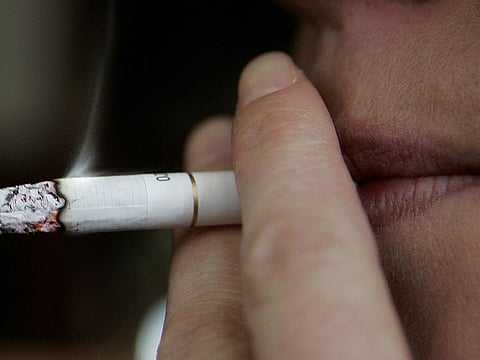UK considers raising smoking age until cigarettes are banned entirely
PM Rishi Sunak says he wants to create Britain's first modern 'smoke-free' generation

London: British Prime Minister Rishi Sunak proposed raising the smoking age by a year, every year, so that children born after 2008 will not be allowed to legally purchase tobacco products even when they become adults.
Sunak announced the idea in a speech Wednesday at the annual Conservative Party conference, saying he wanted to create Britain's first modern "smoke-free" generation. Describing smoking as the "biggest cause of preventable death," Sunak said the policy would mean "a 14-year-old today will never legally be sold a cigarette," to applause from the audience. At present, Britons over 18 can legally buy cigarettes.
The proposal is part of a renewed global crackdown on tobacco and vaping. New Zealand last year passed a law, yet to take effect, prohibiting the sale of tobacco to those born after 2008. Australia unveiled plans to crack down on recreational vaping products, even those not containing nicotine. Hong Kong is considering imposing lifetime tobacco bans for future generations.
In the United States, the Food and Drug Administration this year blocked marketing on 6,500 flavoured e-cigarette products. Last year, the agency announced plans to ban menthol cigarettes, after the sale of tobacco goods increased in 2020 for the first time in two decades.
Aims to phase out smoking completely
The British prime minister's office said it hopes the new legislation - if endorsed by Parliament - can "phase out smoking in young people almost completely as early as 2040." Smoking causes 64,000 deaths in England per year, and costs the economy an estimated $20.7 billion annually via early deaths and costs to the public health system, according to the government.
Calling the policy a "phased approach," Sunak's government said it would not seek to criminalize smoking for current smokers. "I don't believe it would be fair to take away the rights of anyone to smoke who currently does so," he said in his speech. But "none of us, not even those who smoke, want our children to grow up to be smokers," he added.
Sunak's government said officials would look toward imposing further restrictions on vaping, including flavoured products aimed at hooking children onto the habit.
Sunak's policy would apply to England. The other regions of the United Kingdom - Northern Ireland, Scotland and Wales - run their own health systems.
Sunak's remarks triggered a response from tobacco manufacturers. In a short statement, Imperial Brands PLC, which sells well-known cigarette brands like Davidoff and Winston, said Sunak's proposal could create "significant unintended consequences" over time. "On vaping we will continue to engage with the Government to create effective policies which prevent youth access," it added.
Globally, tobacco kills more than 8 million people every year, according to the World Health Organization, despite declining smoking rates in recent years, mostly in higher income countries. The majority of the world's 1.3 billion smokers - 80 percent - live in low- and middle-income countries, the WHO says.
In the United States, 23 percent of adults smoked tobacco in 2020, down from 34 percent in 2000, according to tallies compiled by Our World in Data, a data website. In the United Kingdom, 15 percent of adults were smokers, compared to 38 percent two decades ago. About 14 percent of adults in Australia and New Zealand were smokers, down from 24 percent and 30 percent in 2000, respectively. Norway saw its adult smoking rate fall to 16 percent in 2020, from 44 percent in 2000.
Sign up for the Daily Briefing
Get the latest news and updates straight to your inbox



